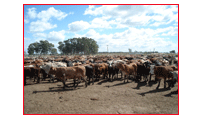By Hani Hazaimeh
AMMAN - The Sudanese government will take back a plot of land allocated for a Jordanian agricultural megaproject if the government does not implement the project within two weeks, Agriculture Minister Saeed Masri said on Wednesday.
The project was supposed to be implemented by a private company with government support, but last week, Masri announced that the private sector partner had withdrawn from the plan, noting that their decision was made unilaterally without prior notification.
Earlier last year, the government announced a plan to enter into an agreement with a coalition comprising four Jordanian firms that had decided to undertake the Sudan project and benefit from customs exemptions and other incentives provided by the Sudanese government.
But the plan did not materialise after the private sector withdrew, citing the government’s failure to fulfil its JD10 million share in the JD60 million project, according to a government official.
In a phone interview with The Jordan Times on Tuesday, Issam Hijazi, CEO of the leading livestock and food importer/manufacturer Hijazi and Ghosheh Group and one of the company founders, confirmed the withdrawal.
The company founders had a firsthand look at the situation of the project in Sudan during a self-initiated, four-day visit that started on August 5, 2008 during which they met with Sudanese officials over the investments and facilities made available by Khartoum.
"The project is quite feasible, but at the time we showed interest in the project, the prices of agricultural food items were at historic highs. Now the prices are almost the same as they were two years ago," Ghosheh said, adding: "Nevertheless, the government was supposed to be a co-investor in the project but now they decided to abandon the partnership."
But Masri stressed that the private sector partner decided to leave the project even before the finance minister's statement that there were no funds allocated for the project in the state budget, adding that he was instructed by Prime Minister Nader Dahabi to go ahead with the investment.
"Now that the private sector has withdrawn from the project, we are in negotiations with the Army-run company Al Bashaer, which is currently farming a total of 39,000 dunums of land adjacent to the project's allocated lands on the banks of the Nile River," he said, stressing that the project's fate is time-sensitive and that it must be implemented before it is too late.
In 1998, the government signed an agricultural protocol with the Sudanese government which entitled Jordan to utilise vast fertile lands on the banks of the Nile to rear livestock and grow crops.
In early 2008, the governor of the Nile River State distributed more than half the land included in the agreement to local farmers in his state as the plan did not materialise a decade after the deal was signed, leaving Jordan with around 87,000 dunums to utilise.
However, due to the government's reluctance to go ahead with the project, the Sudanese government set 2009 as the deadline for the implementation of the agreement, after which the deal would be declared null and void.
8 October 2009













